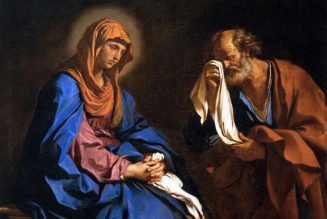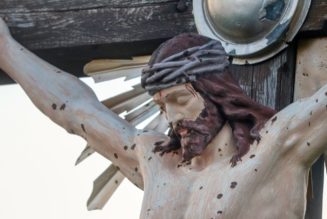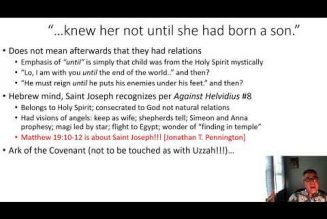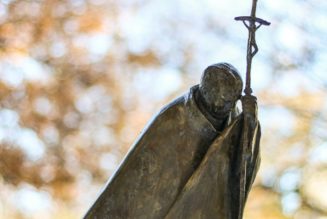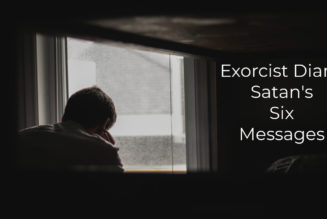Happy Friday friends,
And a happy feast of St. Aelred of Rievaulx to all of you who keep it. For those of you unfamiliar, Aelred is one of those wonderfully named saints of England whose feasts dot the calendar without making much of a spectacle of themselves.
Born in Hexham in about 1109, Aelred ended up in the Scottish court in service to King David, before finally answering the call to religious life that had been growing in his heart as his career progressed. Aelred ended up abbot of the Cistercian community at Rievaulx (that’s in Yorkshire, which is in the north of England, if you’re wondering), which he first entered in his mid 20s in 1133.
Aelred is one of those saints, those many, many, English saints, who are now often as forgotten as the thriving communities they once led — their memory suppressed along with their monasteries.
The truth is, the English canon can rival that of Italy or France for numbers and characters, but in what should be a cautionary tale about the power of a country to forswear and forget its own heritage, few people in that country would know their most famous saints existed at all if it weren’t for the occasional train station or country street named for them.
We hold our history lightly, and for that reason, I kind of delight in marking every obscure optional memoria in the calendar I can. After all, these are the saints who are alive in heaven and, one hopes, interceding for us.
Speaking of alive, JD is on the mend. Or at least so he claims. If he takes it easy over the weekend and continues to improve, we might just see him back next week. Thank you all for your prayers for his recovery. I know he appreciated them.
As did I. It’s a pain not having him in the office some of the time.
Anyway, here’s the news.
The News
Last year, Communion and Liberation acknowledged allegations of “sexual abuse, sexual misconduct, and psychological abuse” made against its former U.S. leader.
But, while an October letter offered an apology to anyone “harmed by these evil acts,” alleged victims say the movement has not addressed elements of its culture which, they say, allowed abuse to occur unchecked in the first place.
The Pillar’s Michelle La Rosa spoke with 10 former and current members of Communion and Liberation, including six women who say they experienced psychological and spiritual manipulation, grooming behavior, and in some cases, sexual assault by Chris Bacich, the former leader accused of abuse and manipulation.
This story has taken months to write, involving hours of conversations with the people affected. It’s an important look into the workings of one of the most important and prominent lay ecclesiastical movements in the post-Vatican Council II Church.
It is very important to tell the stories of these victims, and they deserve to be heard. But there is also a really important story here about how personalities and people interact in lay movements, and how that can create blind spots in leadership and accountability.
There are important lessons here for the Church to learn, and this is first-rate reporting from Michelle.
I urge you to read the whole thing.
—
Pope Francis confirmed Wednesday the appointment of a new leader of the Syro-Malabar Catholic Church.
Bishop Raphael Thattil has been elected as the Major Archbishop of Ernakulam-Angamaly and ex officio head of the second-largest of the 23 Eastern Catholic Churches, in doing so inheriting one of the most challenging jobs in the Church today, with a decades-long liturgical dispute involving a large portion of his own clergy.
So, who is the new major archbishop and what has he inherited along with his new job?
—
Last week, tens of thousands departed the SEEK conference in St. Louis after days spent in spiritual renewal, talks, and communion with other FOCUS missionaries from around the world.
“SEEK to us is a mountaintop moment,” as one put it, but what comes next?
—
A Wisconsin judge suspended a sexual assault case against Theodore McCarrick on Wednesday, after a court-appointed psychologist found the former cardinal incompetent to stand trial.
A Massachusetts judge dismissed assault charges against McCarrick in that state, also because the former cardinal was found to be impeded by dementia from participating in his own defense.
It was, I think, always likely to end this way for the various legal processes launched against McCarrick in the wake of his 2018 disgrace.
A lot of people I have heard form have said McCarrick has “got away” with his crimes and escaped punishment through old age and infirmity. I don’t know about that, though.
McCarrick is, putting it bluntly, not going to live many more years, and he will, at some point soon, have to face what we in the canon law business call “the final tribunal of appeal” before which we all have to appear at some point.
We all want justice, and we want it now. It’s an understandable human impulse. But we need to temper that impulse (I’m talking to myself here) constantly with faith in God’s own justice and love. We (I) also need to recall that baying too loudly to see someone, anyone, even McCarrick, “get what he deserves” is calling for a dangerous standard to be used on me when my time comes.
I guess what I am saying is this: McCarrick isn’t going to die in prison, but he’s going to face the same court I will be due in front of in due course.
Let God’s justice be done and, I hope, His love and mercy too, in accordance with His will.
—
Gianluigi Torzi, the man in the middle of the Vatican London property deal and financial crimes trial, has been arrested. Again.
The “businessman,” I use the term as loosely as I possibly can, has been avoiding Italy for some time now as he faces a string of charges over his various dealings.
—
Cardinal Víctor Manuel Fernández has, it’s obvious to everyone by now, had a difficult first four months as prefect of the Dicastery for the Doctrine of the Faith.
Taking over the role in September, he’s faced questions about his suitability for the job over everything from his writings, to his handling of abuse cases, to his management of the roll out of December’s declaration on blessings.
But while I think rumors of him having offered the pope his resignation in recent weeks are probably overblown, I spoke to some friends in Rome this week about how he came to be appointed in the first place, and if — furores apart — he was delivering on what the pope wanted when he appointed him.
(For what it’s worth, I think Cardinal Tobin would have made a fascinating choice for prefect.)
But is the Fernández gamble paying off, and what exactly are the stakes he represents for the pope’s legacy?
These Catholic Churches
The Symposium of Episcopal Conferences of Africa and Madagascar, or SECAM, issued its “synthesis” of responses to the DDF’s pre-Christmas declaration Fiducia supplicans yesterday.
It was headed “NO BLESSINGS FOR HOMOSEXUAL COUPLES IN THE AFRICAN CHURCHES,” in all caps.
So, not much room for ambiguity there, then.
And the intended significance of the text’s first sentence was no less clear: “The message that I transmit to you today has received the agreement of His Holiness Pope Francis and of His Eminence Cardinal Víctor Manuel Fernández,” wrote Cardinal Fridolin Ambongo of Kinshasa, president of SECAM.
Rome, according to some reactions I have seen, has caved in to the outrage of Africa and put its imprimatur on a text that appears to soundly shut the door on the December DDF declaration.
Alongside necessarily affirmative language that Fiducia supplicans did not, in fact or intention, seek to change Church teaching on human sexuality, the bishops of Africa declared that “the language of Fiducia supplicans remains too subtle for simple people to understand.”
“Furthermore, it remains very difficult to be convincing that people of the same sex who live in a stable union do not claim the legitimacy of their own status,” wrote Cardinal Ambongo.
The document has been hailed by some as a kind of pointed routing of the DDF by the African bishops; a defiant stand in which they have successfully stared down the Vatican’s doctrinal office.
To be sure, there is plenty of language in the document to support this kind of reception, for those who want to offer it.
Few would have expected to see Pope Francis’ approval for a document with references to “the values of the natural law” alongside the Genesis narrative of Sodom and the Levitical prohibition of child sacrifice while discussing the pastoral care of same-sex attracted people, but that is what SECAM has issued.
There has been another reaction, too, though smaller, from some people who claim the SECAM synthesis is actually a coup for the pope and Cardinal Fernández; that they have managed to get the African bishops to accept what Fiducia supplicans says about blessings and to say, publicly and unambiguously, that the declaration does not change Church teaching despite what its most vociferous critics have said — some African bishops among them.
Sure, the African bishops have said they will not be offering such blessings in their dioceses, this second spin goes, but they’ve accepted the premise, and that is the most important concession.
Both interpretations of the SECAM synthesis accept the text as the tacit terms of a global truce over Fiducia supplicans, with the only real disagreement over who “won.”
For myself, I decline to pick a winner. On the contrary, looking at the state of play across the world, I would say the Church is the real loser here.
Both of the dueling interpretations of the SECAM synthesis are effectively correct. But however unambiguous the African bishops are in their statements, it seems obvious to me we will see a no less strident statement emerge from another bishops’ conference or similar body in the coming weeks which will go in the exact opposite direction — Belgium seems a likely candidate, as does Germany or possibly Argentina.
And when that second statement comes out, I expect it to begin with precisely the same language about Pope Francis and Cardinal Fernández’s prior approval.
As I see it, we are moving into an era of “confederation” for the global Church, with apparently diametrically opposed teachings and practices being kept in loose connection to each other by their common approbatio from Rome.
You can already hear the beginnings of this new confederacy in the way some people have started leaning heavily into the language of “the African Churches” in discussing the upshot of the SECAM statement, though the synthesis itself tends to use “the Church in Africa” in most of the text.
Now, to be clear, the Catholic Church is a communion of Churches, properly speaking, be they Latin dioceses or Eastern Churches sui iuris. And it is equally technically correct to speak of “the Churches of Africa” and “the Church in Africa,” just as it would be to speak of “the Churches of Germany” instead of “the Church in Germany.” But we just don’t tend to do so.
To make an analogy, when people in secular politics start talking with sudden emphasis about “these United States” you can usually infer something about how they feel about the federal government.
As all this relates to the one, holy, Catholic and apostolic Church, I’m not optimistic.
The whole situation seems to me to be a slow walk into a two-speed Church, and a kind of informal, trial separation in the ties of doctrine and governance, which make up two of the three constitutive elements of the Catholic communion.
That’s not the resolution to the current crisis. It’s the escalation, which masks itself as face-saving for everyone.
—
The con of the ‘Catholic vote’
It’s an election year, and the primary season is heating up. By that, I mean the news cycle is heating up, not the primary races — from where I sit, the nominations are forgone conclusions for both parties and have been for at least 12 months.
We are set for a likely close and highly contested presidential election, one which will come down to fine margins in swing states, which is just partisan manna for the bloated industry of professional politics and the equally distended media remora fish that swarm around it.
Part of the national political conversation over the next 10 months will include quite a bit of chatter about “the Catholic vote” — which makes up more than 20% of the national population and 25% of the voting public — at least on paper, anyway.
There will be a lot of talk about politicians courting the “Catholic vote.” Joe Biden likes to flash his rosary and make the sign of the cross when mentioning Republicans, though not abortion, on the campaign trail.
And while Donald Trump has no particular time for the Church (or God, to hear him tell it) he has in the past been happy to positively namecheck the peripheral fringe of online Catholic America, including the former nuncio to the U.S., avowed Vladimir Putin fan and now probably schismatic (?) Archbishop Carlo Maria Viganò.
But that’s hardly served to dull the frisson of proximity to power, for some at least.
As for the Republicans’ crowd of nominal primary contestants, they are currently being evaluated by some Catholic news outlets for their values and credentials, presumably before they become irrelevant as the actual primary votes start happening.
And I want to be clear here: reporting on where candidates stand on a range of important issues is a true service.
That work should be done, and done seriously. It should matter to Catholics who vote where the candidates are on the preeminent social concerns of the Church in this country — especially when they present morally incoherent agendas.
I’ve got no beef with people who want to report that out soberly and objectively — without partisan priors or an obvious hunger to curry favor.
But among all that, you will see campaign spox, commentators and other assorted talking heads pop up to deliver their opinion on how candidates can win the “Catholic vote”.
Entire polls will be commissioned and picked apart, and media outlets — Catholic and secular — will eat all this up with a soup ladle — it’s great for clicks and everyone likes to imagine they’re part of a potentially decisive demographic come election day.
But here’s my take, unsolicited and unpopular though it may be: it’s all a con, really. There is no such thing as “the Catholic vote” in American elections. No one has ever been elected president by appealing to it, and no one has ever secured it in a meaningful sense outside of a wider political trend.
Catholics absolutely represent the single most distinct and visible religious demographic in the American electorate, sure. And if you could reliably bank the votes of a quarter of the national electorate it would, indeed, be the end of swing elections. But no one has ever done it. And anyone who says you can doesn’t know a damn thing about American Catholics who, as a general rule, tend to divide quite sharply over their preferred hymnals, let alone presidential candidates.
The simple truth is that there is no “Catholic vote,” any more than there is a “blonde vote” or a “people who can roll their tongue vote.”
Poll after poll, from every possible pollster, campaign, media company, college or research group shows that some 94-97% of American Catholics tend to be nailed down Republicans or Democrats, with 3-6% swinging between the parties — just like the rest of the country.
And I’ve never, in all my years as a Catholic journalist or secular political staffer, seen a successful political appeal to Catholic voters that has much, if anything, to do with Catholicism, as a faith, rather than issues over which Catholics tend to divide just like everyone else — no matter if the Church considers them to be moral absolutes or matters of prudential judgment.
The eventual split of Catholic voters in a given election tends to mirror the general electorate closely and reliably enough that a far more productive use of pollsters’ effort would be probably to use Catholics as a stand-in sample for the nation at large, rather than some kind of unicorn franchise for candidates to hunt.
So why don’t they? And why, if the notion of a gettable “Catholic vote” is so thoroughly exploded in election after election, does everyone keep talking and writing about it?
The answer is simple: money.
Once you accept that a decent chunk of political campaigning and media coverage is about pushing product, it starts to make a lot more sense.
Some demographic groups do swing elections, sure. And some polls are commissioned out of genuine desire for data on how things are playing with voters. But a lot of it is just about raising and spending money, ginning up interest in the results to justify the expense and pandering to the people who paid for it in the first place.
Media is no different, by the way.
For secular media, the “Catholic vote” is a wonderfully useful gruffalo that they can reinvent every election to talk about different issues, usually abortion, sometimes immigration, though usually with the angle that the Church is out of step with what X% of American Catholics believe.
For places that make their money soliciting donations and doing the 501(c) thing, big tables of polling figures and statistical breakdowns make for a very serious-looking slide show in the boardroom.
And for traffic-based websites, where constant content is king, breathless headlines about which way the “Catholic vote” is going make for fun, clickbaity headlines and easy fodder for comment pieces.
The con that there’s a big “Catholic vote” out there to be grabbed is really about feeding readers’ (and viewers’) desires to think there is one, and that they are part of it.
That, and fueling the implied professional relevance of the “experts” who supposedly understand it. There sometimes seems like a whole subset of minor academia is using TV appearances to talk sagely about this nonsense and pad their tenure applications.
It’s all an exercise in mutual self-gratification.
It’s also relatively harmless, I should add. I don’t think it’s especially malicious or sinister — certainly no more so than most of the political-themed snake oil that’s brewed up and sold every election year. But it does make me a little sad when I see it ramping up.
The truth is, most “American Catholics” describe themselves that way, in that order, and the primacy of their American identity usually comes freighted with a partisan affiliation that filters their view of the Church, even if that’s not what they’d say of themselves.
Would that it were the other way around, and nearly a quarter of the electorate were “Catholic Americans” whose politics and votes were formed and cast by their identity in the Church.
That really would be something to write about.
See you next week,
Ed. Condon
Editor
The Pillar
Comments 59
Services Marketplace – Listings, Bookings & Reviews




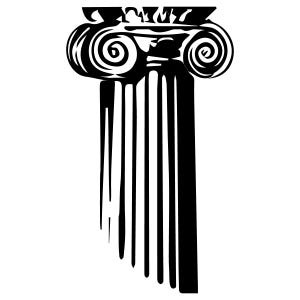
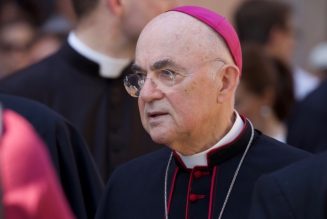
![TikTok is making sea shanties big again [note: skip the first video and jump down to the various ‘Wellerman’ mixes]…](https://salvationprosperity.net/wp-content/uploads/2021/01/tiktok-is-making-sea-shanties-big-again-note-skip-the-first-video-and-jump-down-to-the-various-wellerman-mixes-327x219.jpg)
